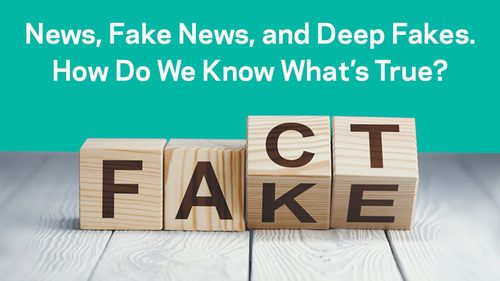
Fakery certainly isn’t a new concept, but in the past few years, the phenomenon of the deepfake has taken the practice of disinformation to a whole new — and often scary — level. The University of Notre Dame’s Ten Years Hence Speaker Series will explore “News, Fake News and Deep Fakes. How Do We Know What’s True?”
Deepfakes are videos or other digital representations that have been manipulated to yield images or sounds to appear real, but are in fact fabricated. The eight events in the series each feature a speaker with extensive expertise on the topic, including how deepfakes and misinformation campaigns affect businesses, personal privacy, news reporting, data security and even democracy.
The annual spring series, hosted by Notre Dame’s Mendoza College of Business in partnership with ThinkND, will be held virtually this year via Zoom. It is open to all members of the Notre Dame community as well as the general public. Attendees should register via this link. Registration is necessary just once; the Zoom link will remain the same for each lecture.
The full schedule is as follows:
Feb. 5: Matthew Ferraro, counsel in the Washington, D.C., office of Wilmer Cutler Pickering Hale and Dorr LLP; “Fake News, Real Costs: How Disinformation and Deep Fakes Impact Business.” Ferraro’s expertise includes the threats that digital disinformation and deepfakes pose to corporations, brands and markets, and the evolving regulatory environment surrounding these issues.
Feb. 12: Malachy Browne, senior story producer for The New York Times; “Visual Investigations: Innovation in Storytelling.” Browne specializes in visual investigations, a form of accountability and explanatory journalism that combines traditional reporting with advanced digital forensics.
March 12: Suzanne Spaulding, senior adviser for homeland security and director of the Defending Democratic Institutions project at the Center for Strategic and International Studies; “Disinformation and Democracy.” Spaulding, who also serves as a member of the Cyberspace Solarium Commission, previously was the undersecretary at the Department of Homeland Security, leading the National Protection and Programs Directorate, which has since been renamed to the Cybersecurity and Infrastructure Security Agency.
March 19: Matthew Turek, program manager for the Defense Advanced Research Projects Agency Information Innovation Office; “Automated Approaches to Detecting, Attributing, and Characterizing Falsified Media.” Turek’s research interests include computer vision, machine learning and artificial intelligence and their application to problems with significant societal impact.
March 26: Jamie Fly, senior fellow and senior adviser to the president; “Making America Competitive Again in the Information Space.” Fly works out of the Berlin office of the German Marshall Fund, where he researches and speaks about transatlantic relations, U.S. foreign policy, great power competition with Russia and China, and democracy and human rights.
April 9: Hany Farid, professor at the University of California-Berkeley School of Information; “Trust and Truth in the Age of Deep Fakes.” Farid’s research focuses on digital forensics, image analysis and human perception.
April 16: Sarah Cook, research director for China, Hong Kong and Taiwan at Freedom House. Cook directs the China Media Bulletin, a monthly digest in English and Chinese providing news and analysis on media freedom developments related to China.
April 30: Danielle Citron, professor at the University of Virginia School of Law; “The End of Privacy: How Intimacy Became Data, and How to Stop It.” Citron is a legal scholar addressing the scourge of cyber harassment by raising awareness of the toll it takes on victims and proposing reforms to combat the most extreme forms of online abuse.
The Ten Years Hence Speaker Series explores issues, ideas and trends likely to affect business and society over the next decade. Students, faculty and the community use guest speaker comments as a springboard for structured speculation about emerging issues and the next 10 years.
Ten Years Hence is sponsored by the O’Brien-Smith Leadership Program made possible by a generous endowment from William H. O’Brien (ND ’40) and his wife, Dee. The program is named after their respective parents. The O’Brien-Smith Program endowment provides an opportunity for students and faculty to interact with distinguished leaders from business, government and non-profit sectors.
More information about the series, including full speaker bios, is available at Ten Years Hence or by contacting lecture coordinator Jean Meade at Jean.Meade@nd.edu.